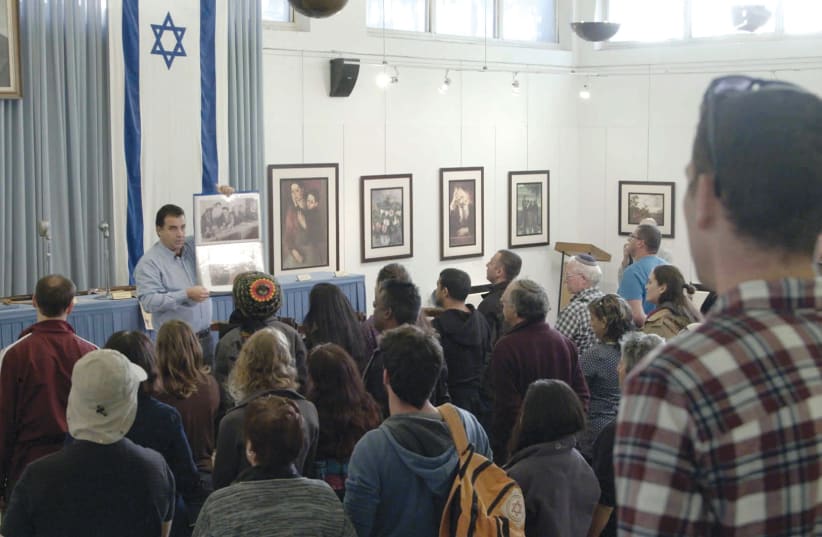Originally commissioned by Channel 2 (now Keshet 12), to help mark the celebration of the 70th anniversary of Israel’s founding, Our Natural Right will be aired on Channel 12 next month for Independence Day. Our Natural Right made its Israel debut at the December 2020 Solidarity -Tel Aviv Human Rights Film Festival as a featured selection.
The film – made with seasoned award-winning filmmaker Yulie Cohen – tells the historic story through the voices of 10 adult grandchildren, all descendants of original signers of Israel’s Declaration of Independence.
This concept began when Nir and Bornstein – whose production company is called Udi v Sagi – were making their last acclaimed documentary, Golda, which had uncovered a previously unseen off-the-record television studio interview with former prime minister Golda Meir, also a signer of the Declaration of Independence. In their research process the filmmakers came in contact with Golda’s grandson, accomplished Israeli musician Gideon Meir. He shared his remembrance that the signing of the Declaration of Independence was a pivotal moment in Golda’s life, which brought her to tears as she signed.
Yet in recalling the moment, Gideon Meir poses the question all descendants of historically accomplished grandparents contend with: “What is my responsibility, where is our generation, are we personally committed to do something to fulfill this Declaration?”
This is the central theme director Cohen was brought onto the project to explore. As the daughter of parents who fought for the establishment of Israel in the War of Independence, she grew up in a house that featured a replica of the Declaration of Independence hung on the wall, fully grasping the idealism and vision behind the creation of an independent safe Jewish homeland. Her life changed after experiencing a terror attack on an El Al jet in which she was a member of the flight crew. She applied her storytelling skills, developed in the early 1980s as part of the IDF public spokesperson unit, where she also found a dissonance between the messaging and the reality, to make her first acclaimed documentary, My Terrorist.
The making of that film began a storytelling journey for Cohen that resulted in a trilogy bluntly contrasting the myths upon which she was raised and educated with the realities of living in this complex disjointed society. It was this track record of finding and uncovering barely hidden predicaments that Udi v Sagi felt would add the creative spark to enliven a historical subject and event.
IN ADDITION to interviews with the grandchildren, the filmmakers found several creative devices to weave an engaging audience experience. In location-scouting trips to Independence House, where the Declaration was announced by leader of the “People’s Council” David Ben-Gurion, they found professional tour guides walking various visiting groups through the official version of the event. Utilizing historic recordings for dramatic effect, tour guides present a story as Israel’s government wishes it to be told and understood.
“This is where it happened,” the film opens with a tour guide dramatically declaring, “as they say in Hebrew, Ashkara (absolutely, in actuality).” The official presentation ends the same with every tour group as they are asked to rise for the singing of “Hatikvah,” reenacting the emotional summation of that Friday afternoon ceremony in May of 1948.
Well-known pre-state cultural touchstones also abound, including kibbutz home movies, crowds gathered outside in anticipation, and post-announcement dancing in the streets of Tel Aviv. Yet it is the personal memories shared by the grandchildren that provide the emotional centerpiece of Our Natural Right.
Tel Aviv advocate and progressive political activist Nitzan Kahana recalls her grandfather, Orthodox rabbi Kalman Kahana, who at 36 was the youngest signer. Nitzan clearly feels a special responsibility as a direct descendant, saying, “I do not have the privilege not to be optimistic,” regarding his 60 grandchildren. “I inherited the political initiative from my grandpa and decided to devote my life to the prevention of sexual assault.”
Yet it is a granddaughter of famed diplomat Dr. Avraham Katznelson who lays bare the challenge of facing the failures of modern Israel to achieve the idealistic vision of its founders who signed the declaration. Hebrew University history Prof. Nurit Peled Elhanan at one point bathes in the personal glow of her beloved grandfather, a cultured man who advocated for a bi-national state, an advocate of labor Zionism serving on the central committee of Mapai and Hashomer Hatzair.
Says Peled Elhanan, “The words are genius. ‘By virtue of our natural and historic right’ – it’s a mythological right, yet it left a mark on education and the culture.”
She provides a stark point of dissonance that switches the direction of the film from the celebratory to the questioning. Many have noted the word “democracy” is missing from the Declaration, and no mention of Jerusalem as Israel’s capital was included as well.
Producer Nir explained that working through the filmmaking process with Cohen and the interviews with grandchildren of signers allowed him to “understand my parents better, in how they think and talk about the Zionist enterprise.”
“My generation has a more reserved attitude about what the document represents. As we watched the debates arise over the Nation-State law, we had a more distant attitude, but we became aware and more critical of the text and what is lacking, how that’s been a factor in politics and the electoral process.”
